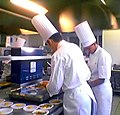Irish surname origin
Cooke (rather than Cook) is the usual spelling of the surname in Ireland, where it is found throughout all four provinces. In Connacht, Cooke is the modern anglicized form of the Gaelic name Mac Dhabhóc (also called Mac Uag). [2] In Leinster, it is mainly an occupational name, long established there. [3] In 1465, a law was passed that impacted Gaelic surnames in several counties in Leinster, specifically, Dublin, Meath, Louth and Kildare. The law required that "every Irishman, dwelling betwixt or amongst Englishmen... shall take to him an English surname of one town, as Sutton, Chester, Trim, Skryne, Cork, Kinsale; or colour, as white, black, browne; or art or science, as smith or carpenter; or office, as cooke, butler...". [4] In Ulster, many Cookes descend from the MacCooks (MacCuagh) of Kintyre, a branch of the Clan MacDonald. [5]
The surname was distributed throughout Ireland in the mid-nineteenth century. The highest numbers of Cooke households were found in counties Cavan, Galway, and Armagh, reflecting a strong presence in both Connacht and Ulster. Other areas, such as counties Cork and Tipperary, also had significant numbers of households. Below is the detailed distribution of Cooke households by county: [6]
| Distribution of Cooke households in Ireland (mid-19th century) |
|---|
| Cavan: 61 | Offaly: 18 |
| Galway: 51 | Leitrim: 17 |
| Armagh: 45 | Fermanagh: 15 |
| Tyrone: 43 | Down: 13 |
| Tipperary: 40 | Laois: 12 |
| Antrim: 34 | Monaghan: 11 |
| Cork: 34 | Kildare: 10 |
| Derry: 32 | Waterford: 9 |
| Westmeath: 31 | Louth: 8 |
| Kilkenny: 30 | Wicklow: 6 |
| Donegal: 26 | Kerry: 6 |
| Limerick: 26 | Longford: 6 |
| Wexford: 26 | Carlow: 6 |
| Dublin: 25 | Mayo: 3 |
| Sligo: 24 | Roscommon: 3 |
| Meath: 18 | |
This page is based on this
Wikipedia article Text is available under the
CC BY-SA 4.0 license; additional terms may apply.
Images, videos and audio are available under their respective licenses.
